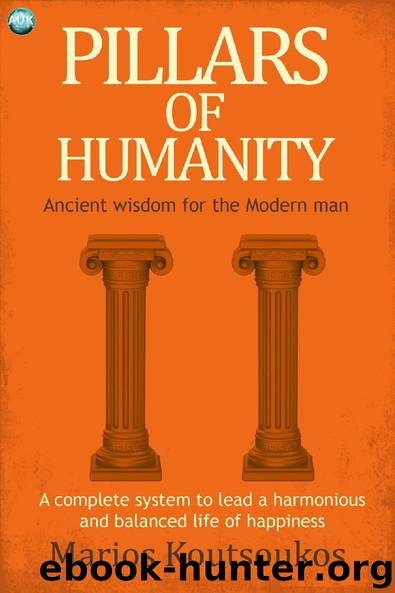Pillars of Humanity: the Delphic Admonitions by Marios Koutsoukos

Author:Marios Koutsoukos
Language: eng
Format: epub
Tags: Delphi, Oracle, Delphic Maxims, Delphic Admonitions, Ancient Greece, Greek, Philosophy, Apollo, Self-Help, esoteric, New Age, God, gods, Olympus, Socrates, Aristotle, Classical, ancient text, Pythia, theosophy, religion, Paganism, City State, Pagan, Self-growth, Self-awareness, Know Thyself, Epsilon, mysticism, theology, Philosophers, History, Historical anecdotes, Olympic, Seven Sages of Antiquity, non fiction, essay, Hellenistic, inscriptions, Hellenism, Traditions, Sybil, Prophpecy
ISBN: 9781782349198
Publisher: Andrews UK Limited 2013
Published: 2013-05-21T00:00:00+00:00
112
“HONOR PROVIDENCE”
“Pronoia” (providence) can mean a lot of different things: a person’s ability to prepare beforehand for what is to come, care administered to others, forethought in practical matters and even Divine Providence. Therefore, this particular Admonition can be interpreted on many levels - honor those who display forethought and preparedness. Strive to imitate their example. Be ready for what might come. Honor those who take care of the weak or who care for you. Hold in high esteem the concept of caring and providing for those unable to fend for themselves. Look up to philanthropists and aspire to become one yourself. In the beginning of the 11 th century the Roman Empire (often referred to as “Byzantine Empire” by modern historians) introduced officially the institution of “pronoia”. It was a system of granting dedicated streams of state income to individuals and institutions in need, very much like modern-day “welfare”. From a theological point of view the meaning of “providence” in this Admonition is to be identified with the esoteric concept of “Divine Providence” taught amongst the Platonists and Pythagoreans: the Supreme Deity watching over all creation had set thing in motion during the birth of the Cosmos in such a way that all beings, mortal as well as immortal, would be provided and cared for through incomprehensible and unexpected ways. Emperor Augustus personified this notion of Divine Providence in the form of the goddess Providentia who, unlike other goddesses, had little or no mythological pedigree to boast of yet very quickly became integral part of the Imperial cult of Rome. During the first two centuries of the Common era the Christian Fathers who studied at the school of Alexandria alongside Neo-Platonists integrated this concept of Divine Providence (and the subsequent pious obligation to honor it) into the Christian dogma.
113
“SUSPECT NO ONE”
Do not approach people with suspicion in your heart. Be willing to accept others as they present themselves to you. Judge them according to what they have said and done to you; not according to what you suspect they might say of you or do to you. This particular Admonition completes the meaning of maxim 47. An echo of this amalgam of non-suspicion and vigilance in the approach of social interactions can be found in the gospel of Mathew (10:16) in the words of Jesus Christ: “Behold, I send you forth as sheep in the midst of wolves: be ye therefore wise as serpents, and harmless as doves.”
114
“ABSTAIN FROM WHAT BELONGS TO ANOTHER”
This Admonition is very similar to the eighth Commandment of the Pentateuch, “Thou shalt not steal”. In his controversial work “Hebrew is Greek” the learned Joseph Yahunda maintains that before the henotheistic, Abrahamic sect prevailed over the earlier polytheistic sects of the Hebrews, the god Pahad (or Phoebus Apollo) was worshiped, as recognized by Isaac and Jacob (Ib. 31. 42. 53). In any case, the meaning of this particular maxim urges one to stay away from that which does not belong to him: not only in action but also in thought.
Download
This site does not store any files on its server. We only index and link to content provided by other sites. Please contact the content providers to delete copyright contents if any and email us, we'll remove relevant links or contents immediately.
| Anthropology | Archaeology |
| Philosophy | Politics & Government |
| Social Sciences | Sociology |
| Women's Studies |
The Boy, the Mole, the Fox and the Horse by Charlie Mackesy(3110)
The Traveler's Gift by Andy Andrews(2454)
The Boy, The Mole, The Fox and The Horse by Mackesy Charlie(1704)
Ethics 101 by John C. Maxwell(1538)
The Greatest Miracle in the World by Og Mandino(1360)
The Little Things by Andy Andrews(1328)
Eichmann in Jerusalem by Hannah Arendt(1164)
Twenty-Two by Allison Trowbridge(999)
Integrity: The Courage to Meet the Demands of Reality by Henry Cloud(945)
Dispelling Wetiko by Levy Paul(879)
12 Rules for Life, An Antidote to Chaos by Jordan B. Peterson(863)
Ethics into Action by Peter Singer(854)
Why Courage Matters by John McCain(844)
War is a Force That Gives Us Meaning by Chris Hedges(774)
Ethics, Subjectivity and Truth by Michel Foucault(755)
Ethics: A Very Short Introduction by Simon Blackburn(750)
On the Genealogy of Morality (Hackett Classics) by Friedrich Nietzsche(735)
Eating Animals by Foer Jonathan Safran(719)
A Guide to the Good Life by William B. Irvine(711)
